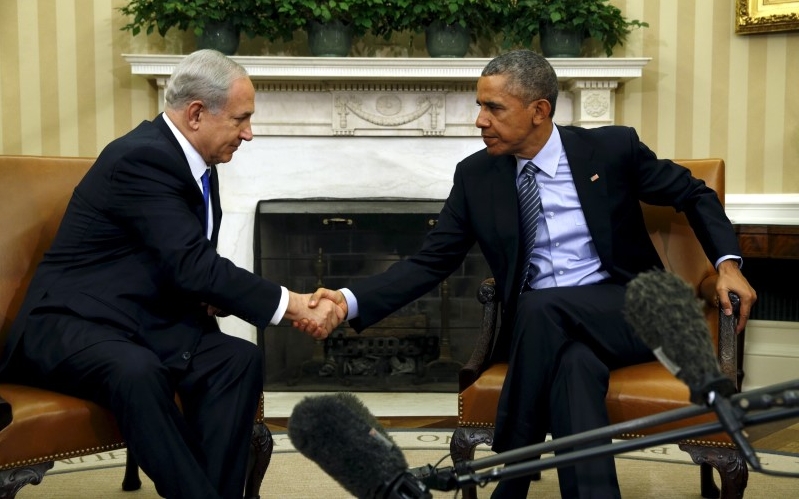
Israeli Prime Minister Benjamin Netanyahu on Monday reaffirmed his commitment to a two-state solution to the Israeli-Palestinian conflict as he met U.S. President Barack Obama in a bid to mend ties strained by acrimony over Iran and Middle East diplomacy.
Meeting Obama for the first time since the signing of the Iran nuclear deal, Netanyahu said he backed a vision of "two states for two peoples" but maintained that Palestinians in turn must recognize Israel as a Jewish state, a condition they have rejected.
Netanyahu's White House visit was clouded by an ongoing wave of Palestinian stabbing and shooting attacks that have Israelis on edge at a time when Obama has concluded that a peace deal is beyond reach during the final 14 months of his presidency.
Obama condemned the latest wave of Palestinian violence and backed Israel's right to defend itself but said he wanted to hear Netanyahu's ideas for lowering tensions. The two also discussed negotiations on a new beefed-up U.S. military aid package for Israel, Washington's chief Middle East ally.
Netanyahu's recommitment to the two-state solution, the bedrock of U.S. diplomacy on the conflict for decades, could satisfy the Obama administration's desire that he clarify his position after he appeared to backtrack on his pledge during a hard-fought re-election campaign earlier this year.
"We have not given up our hope for peace," Netanyahu told reporters allowed in at the start of talks with Obama.
U.S.-sponsored peace talks between Israel and the Palestinians collapsed in 2014. But the eruption of violence between the two sides last month has made an end to that bloodshed a more immediate priority.
The meeting, the first between the two leaders in 13 months, was widely seen as an effort patch up relations long fraught with tensions over U.S.-led nuclear diplomacy with Iran, Israel's arch-foe, and differences over how to resolve the Israeli-Palestinian conflict.
Though Obama and Netanyahu sought to play down their disagreements, no one expected that the two leaders, after years of testy relations, would have much success in overcoming their poor personal chemistry.
They appeared cordial and businesslike in their brief interaction before the press on Monday, in stark contrast to a 2011 Oval Office encounter when Netanyahu lectured Obama on the suffering of the Jewish people through the ages.
Netanyahu leaned forward listening intently as Obama spoke, sometimes nodding. Obama, his legs crossed, sometime cradled his chin in one hand. The two shook hands twice for the cameras.
MILITARY AID
The meeting was seen as an important step in negotiations for a new 10-year U.S. defense aid pact, which could help burnish the right-wing prime minister's security credentials, now challenged by the violence at home.
Israel now receives $3.1 billion from the United States annually and wants $5 billion per year for the next package, for a total of $50 billion over a decade, congressional officials have told Reuters. One U.S. official predicted the sides would settle for an annual sum of $4 billion to $5 billion.
Obama's tangible support for Israel's security could help deflect accusations from Republican presidential hopefuls that he and any Democrat successor are less pro-Israel than they profess to be.
U.S. voters will elect a new president in November 2016.
"The security of Israel is one of my top foreign policy priorities, and that has expressed itself not only in words, but in deeds," Obama said.
Netanyahu thanked Obama for that commitment.
The dispute over the deal that Iran reached in July with world powers, which calls for curbs on its nuclear program in return for sanctions relief, had driven an already rocky relationship between the two leaders to a new low.
Obama refused to see Netanyahu in March when the Israeli leader accepted an invitation from Republican leaders, without consulting the White House, and gave a speech to Congress in which he harshly criticized Obama's negotiations with Iran, Israel's regional arch-foe.
Now that Netanyahu has lost his fight against the Iran accord, he and Obama appeared determined to move beyond the nasty public dispute and to try to put relations on an even keel.






